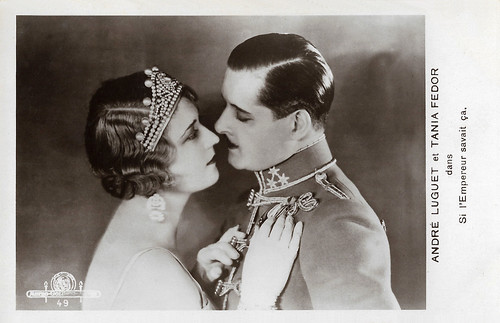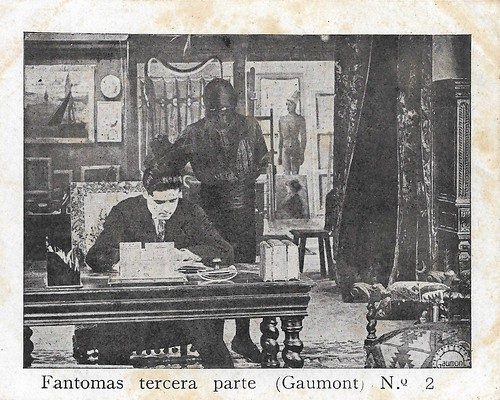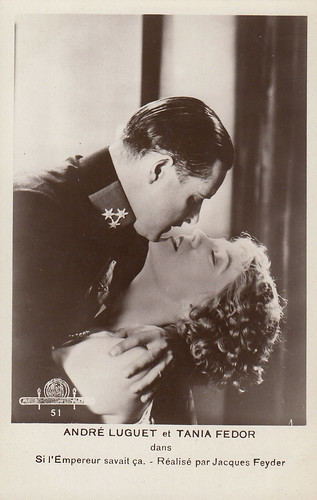André Luguet (1892-1979) was a French stage and film actor. He appeared in over 120 films between 1910 and 1970, both in France and Hollywood.

French postcard in the series Les Vedettes de Cinéma by Editions A.N., Paris, no. 100. Photo: Sartony.

French postcard in the series Nos artistes dans leur loge, no. 308 by Editions La Fayette, Paris. Photo: Comoedia.

Belgian postcard by P.I.A. Belgaphot, Bruxelles, no. 49. Photo: Metro-Goldwyn-Mayer. Tania Fédor and André Luguet in Si l’empereur savait ça/His Glorious Night (Jacques Feyder, 1930).
André Maurice Jean Allioux-Luguet was born in Fontenay-sous-Bois, France in 1892. In 1910, he made his film debut for the Éclair studio in the silent short Le gamin de Paris (Victorin-Hippolyte Jasset, 1910).
In the following years, he starred in dozens of these short films for the Gaumont studio. He appeared in such productions as Les béquilles/The Crutches (Léonce Perret, 1911) opposite Yvette Andréyor, On ne joue pas avec le Coeur/We Do Not Play With the Heart (Léonce Perret, 1911) with Alice Tissot, and L'âme du violon/The Soul of the Violin (Léonce Perret, 1911) with Yvette Andréyor and Léonce Perret.
He also worked with Louis Feuillade on such films as La fille du margrave/The Daughter of Margrave (Louis Feuillade, Léonce Perret, 1912), Les cloches de Pâques/Th Easter Bunny (Louis Feuillade, 1912) and Le ménestrel de la reine Anne/The Minstrel of Queen Anne (Louis Feuillade, 1913). Luguet portrayed German composer and pianist Ludwig van Beethoven in La gloire et la douleur de Ludwig van Beethoven/The Glory and the Pain of Ludwig van Beethoven (Georges-André Lacroix, 1912).
A highlight was the playful comedy Léonce à la campagne/Léonce in the countryside (Léonce Perret, 1913) with Perret and Suzanne Le Bret. Another highlight was Le mort qui tue/The Dead Man Who Killed (Louis Feuillade, 1913), starring René Navarre as the criminal mastermind Fantomas.
George Elliott at IMDb: “Also known as The Dead Man Who Killed and The Murderous Corpse (the DVD title), this third entry in the five-part series runs the longest at 90 minutes and so far it's the best of the three. With Inspector Juve out of the way it's up to reporter Fandor (Georges Melchior) to try and locate Fantomas (René Navarre) and his crime ring. Jacques Dollon (Luguet) is behind bars where he's murdered only to have his body disappear shortly afterwards but the crime takes an additional twist when we get another murder victim who has a fingerprint from Dollon on her.”

Spanish minicard (collector card) by Reclam Films, Mallorca, no. 2 of 6. Photo: Gaumont. Scene from the third episode of the French silent crime serial Fantomas, Le Mort qui tue/The Dead Man Who Killed (Louis Feuillade, 1913). Fantomas (René Navarre), dressed as the Black Man, is about to chloroform the painter Jacques Dollon (André Luguet).

French postcard by Cinémagazine-Édition, Paris, no. 420. Photo: Sartony.

French postcard by E.C., Paris. no. 71.
André Luguet returned to Éclair for the drama Bagnes d'enfants/The House of Correction (Emile Chautard, 1914), but in the following years, he worked for several studios.
Among these productions are France d'abord/France First (Henri Pouctal, 1915) starring Pierre Fresnay, Les vieilles femmes de l'hospice/The Old Women of the Hospital (Jacques Feyder, 1917) and Les cinq gentlemen maudits/Five Doomed Gentlemen (Luitz-Morat, Pierre Régnier, 1920).
During the 1920s, Luguet continued to star in such silent films as Soirée mondaine/Social Event (Pierre Colombier, 1923) and La revue des revues/Parisian Pleasures (Joe Francis, 1927) starring Josephine Baker in eye-popping stage numbers.
Luguet directed himself in Pour régner/In Order to Rule (1926). He easily made the transition to sound in such films as La voix de sa maîtresse/The Voice of His Mistress (Roger Goupillières, 1929) with Huguette Duflos.
In 1925 André Luguet started to work at the Comédie-Française where he was a Sociétaire till 1932.

Belgian postcard by S.A. Cacao et Chocolat Kivou, Vilvoorde / N.V. Cacao en Chocolade Kivou, Vilvoorde. Photo: Metro-Goldwyn-Mayer.

Belgian postcard by P.I.A. Belgaphot, Bruxelles, no. 51. Photo: Metro-Goldwyn-Mayer. Tania Fédor and André Luguet in Si l’empereur savait ça/His Glorious Night (Jacques Feyder, 1930). Collection: Marlene Pilaete.

French postcard. Photo Pathé-Natan. André Luguet and Gaby Morlay in Il était une fois/Once Upon a Time (Léonce Perret, 1933). In this film, Gaby Morlay, Georges Mauloy, André Dubosc, Jean Max and Jean Bara reprised the roles they had created at the Théâtre des Ambassadeurs in Paris from 12-2-1932.
Hollywood studios decided to make alternate language versions of their sound productions for the European market. So they flew in several French and German actors and directors, including André Luguet. For MGM, he co-starred with Jetta Goudal in Le spectre vert/The Green Ghost (Jacques Feyder, 1930).
He played a count in the Warner Bros production The Mad Genius (Michael Curtiz, 1931), an all-talking pre-code horror drama starring John Barrymore as a crippled puppeteer who runs the life of a male ballet dancer (Donald Cook).
Luguet played another count in the comedy-mystery Jewel Robbery (William Dieterle, 1932), starring William Powell and Kay Francis.
He played opposite Buster Keaton in Buster se marie (Claude Autant-Lara, Edward Brophy, 1931), the French-language version of Keaton's comedy Parlor, Bedroom and Bath (1931).
André Luguet also appeared in the romantic drama The Man Who Played God (John G. Adolfi, 1932) starring George Arliss and Bette Davis.

French postcard by Éditions P.I., Paris, no. 78. Photo: Roger Carlet.

French postcard by S.E.R.P., Paris, no. 80. Photo: Studio Harcourt.

French postcard by Editions Chantal, Rueil, no. 587a. Photo: Sirius.
Paramount opened a studio in France, where André Luguet co-starred with Meg Lemonnier in the sports comedy Une faible femme/A Weak Woman (Max de Vaucorbeil, 1933).
He reunited with Léonce Perret for the drama Il était une fois/Once Upon A Time (1933) with Gaby Morlay.
Other interesting films were Samson (Maurice Tourneur, 1936) starring Harry Baur, and the Alexander Pushkin adaptation La dame de pique/Queen of Spades (Fyodor Otsep, 1937) with Pierre Blanchard.
In 1939 he had the male lead in the French drama Jeunes filles en détresse/Girls in Distress (Georg Wilhelm Pabst, 1939) with Marcelle Chantal and Micheline Presle.
Funny and touching is Battement de coeur/Beating Heart (Henri Decoin, 1940) with Danielle Darrieux. Another pleasant comedy was Claude Autant Lara’s film Le mariage de Chiffon/Chiffon’s Marriage (1942) with Odette Joyeux as Chiffon.

French postcard by Erres, no. 15. Photo: Pathé-Natan.

Belgian postcard by F.I.A. Belga phot, Bruxelles (Brussels). Photo: Metro-Goldwyn-Mayer.

Belgian postcard by Photo Édition (P.E.), no. 191. Photo: Studio Cayet.
After the war, André Luguet starred in the romance Six heures à perdre/Six Hours to Lose (Alex Joffé, 1946) with Denise Grey and in one of his first roles, Louis de Funès, and in Au petit bonheur/Happy Go Lucky (Marcel L'Herbier, 1946) with Danielle Darrieux. He worked again with L’Herbier at Le père de Mademoiselle/The Father of Mademoiselle (Marcel L'Herbier, 1953) with Arletty.
He had a supporting part in the comedy Monte Carlo Baby (Jean Boyer, Lester Fuller, 1953), one of the first films with Audrey Hepburn, and appeared in Preston Sturges’ final comedy Les carnets du Major Thompson/The Diary of Major Thompson (1955), featuring Jack Buchanan.
He was Brigitte Bardot’s father in Une parisienne/La Parisienne (Michel Boisrond, 1957), and had supporting parts in John Huston’s adventure drama The Roots of Heaven (1958) and in Paris Blues (Martin Ritt, 1961) with Paul Newman.
In Un monsieur de compagnie/Male Companion (Philippe de Broca, 1964), he played the wealthy grandfather of the main character Antoine, played by Jean-Pierre Cassel. After the death of his grandfather, the money has gone and Antoine is motivated to change his life and try to earn his own money.
Luguet played a colonel in the French comedy thriller Pleins feux sur Stanislas/Killer Spy (Jean-Charles Dudrumet, 1965), starring Jean Marais. The film was a sequel to L'honorable Stanislas, agent secret (Jean-Charles Dudrumet, 1963). In later years, he mostly worked for French TV. André Luguet died in 1979 in Cannes, France. He was 87. His daughter was the actress Rosine Luguet (1921-1981).

French postcard by A. Noyer (A.N.), Paris, no. 160. Photo: Roger Carlet.

French postcard by Editions P.I., Paris, no. 78. Photo: Eclair Journal.
Sources: AllMovie, Wikipedia and IMDb.
This post was last updated on 6 April 2025.

French postcard in the series Les Vedettes de Cinéma by Editions A.N., Paris, no. 100. Photo: Sartony.

French postcard in the series Nos artistes dans leur loge, no. 308 by Editions La Fayette, Paris. Photo: Comoedia.

Belgian postcard by P.I.A. Belgaphot, Bruxelles, no. 49. Photo: Metro-Goldwyn-Mayer. Tania Fédor and André Luguet in Si l’empereur savait ça/His Glorious Night (Jacques Feyder, 1930).
The dead man who killed
André Maurice Jean Allioux-Luguet was born in Fontenay-sous-Bois, France in 1892. In 1910, he made his film debut for the Éclair studio in the silent short Le gamin de Paris (Victorin-Hippolyte Jasset, 1910).
In the following years, he starred in dozens of these short films for the Gaumont studio. He appeared in such productions as Les béquilles/The Crutches (Léonce Perret, 1911) opposite Yvette Andréyor, On ne joue pas avec le Coeur/We Do Not Play With the Heart (Léonce Perret, 1911) with Alice Tissot, and L'âme du violon/The Soul of the Violin (Léonce Perret, 1911) with Yvette Andréyor and Léonce Perret.
He also worked with Louis Feuillade on such films as La fille du margrave/The Daughter of Margrave (Louis Feuillade, Léonce Perret, 1912), Les cloches de Pâques/Th Easter Bunny (Louis Feuillade, 1912) and Le ménestrel de la reine Anne/The Minstrel of Queen Anne (Louis Feuillade, 1913). Luguet portrayed German composer and pianist Ludwig van Beethoven in La gloire et la douleur de Ludwig van Beethoven/The Glory and the Pain of Ludwig van Beethoven (Georges-André Lacroix, 1912).
A highlight was the playful comedy Léonce à la campagne/Léonce in the countryside (Léonce Perret, 1913) with Perret and Suzanne Le Bret. Another highlight was Le mort qui tue/The Dead Man Who Killed (Louis Feuillade, 1913), starring René Navarre as the criminal mastermind Fantomas.
George Elliott at IMDb: “Also known as The Dead Man Who Killed and The Murderous Corpse (the DVD title), this third entry in the five-part series runs the longest at 90 minutes and so far it's the best of the three. With Inspector Juve out of the way it's up to reporter Fandor (Georges Melchior) to try and locate Fantomas (René Navarre) and his crime ring. Jacques Dollon (Luguet) is behind bars where he's murdered only to have his body disappear shortly afterwards but the crime takes an additional twist when we get another murder victim who has a fingerprint from Dollon on her.”

Spanish minicard (collector card) by Reclam Films, Mallorca, no. 2 of 6. Photo: Gaumont. Scene from the third episode of the French silent crime serial Fantomas, Le Mort qui tue/The Dead Man Who Killed (Louis Feuillade, 1913). Fantomas (René Navarre), dressed as the Black Man, is about to chloroform the painter Jacques Dollon (André Luguet).

French postcard by Cinémagazine-Édition, Paris, no. 420. Photo: Sartony.

French postcard by E.C., Paris. no. 71.
Eye-popping stage numbers
André Luguet returned to Éclair for the drama Bagnes d'enfants/The House of Correction (Emile Chautard, 1914), but in the following years, he worked for several studios.
Among these productions are France d'abord/France First (Henri Pouctal, 1915) starring Pierre Fresnay, Les vieilles femmes de l'hospice/The Old Women of the Hospital (Jacques Feyder, 1917) and Les cinq gentlemen maudits/Five Doomed Gentlemen (Luitz-Morat, Pierre Régnier, 1920).
During the 1920s, Luguet continued to star in such silent films as Soirée mondaine/Social Event (Pierre Colombier, 1923) and La revue des revues/Parisian Pleasures (Joe Francis, 1927) starring Josephine Baker in eye-popping stage numbers.
Luguet directed himself in Pour régner/In Order to Rule (1926). He easily made the transition to sound in such films as La voix de sa maîtresse/The Voice of His Mistress (Roger Goupillières, 1929) with Huguette Duflos.
In 1925 André Luguet started to work at the Comédie-Française where he was a Sociétaire till 1932.

Belgian postcard by S.A. Cacao et Chocolat Kivou, Vilvoorde / N.V. Cacao en Chocolade Kivou, Vilvoorde. Photo: Metro-Goldwyn-Mayer.

Belgian postcard by P.I.A. Belgaphot, Bruxelles, no. 51. Photo: Metro-Goldwyn-Mayer. Tania Fédor and André Luguet in Si l’empereur savait ça/His Glorious Night (Jacques Feyder, 1930). Collection: Marlene Pilaete.

French postcard. Photo Pathé-Natan. André Luguet and Gaby Morlay in Il était une fois/Once Upon a Time (Léonce Perret, 1933). In this film, Gaby Morlay, Georges Mauloy, André Dubosc, Jean Max and Jean Bara reprised the roles they had created at the Théâtre des Ambassadeurs in Paris from 12-2-1932.
An all-talking pre-code horror drama
Hollywood studios decided to make alternate language versions of their sound productions for the European market. So they flew in several French and German actors and directors, including André Luguet. For MGM, he co-starred with Jetta Goudal in Le spectre vert/The Green Ghost (Jacques Feyder, 1930).
He played a count in the Warner Bros production The Mad Genius (Michael Curtiz, 1931), an all-talking pre-code horror drama starring John Barrymore as a crippled puppeteer who runs the life of a male ballet dancer (Donald Cook).
Luguet played another count in the comedy-mystery Jewel Robbery (William Dieterle, 1932), starring William Powell and Kay Francis.
He played opposite Buster Keaton in Buster se marie (Claude Autant-Lara, Edward Brophy, 1931), the French-language version of Keaton's comedy Parlor, Bedroom and Bath (1931).
André Luguet also appeared in the romantic drama The Man Who Played God (John G. Adolfi, 1932) starring George Arliss and Bette Davis.

French postcard by Éditions P.I., Paris, no. 78. Photo: Roger Carlet.

French postcard by S.E.R.P., Paris, no. 80. Photo: Studio Harcourt.

French postcard by Editions Chantal, Rueil, no. 587a. Photo: Sirius.
Funny and touching
Paramount opened a studio in France, where André Luguet co-starred with Meg Lemonnier in the sports comedy Une faible femme/A Weak Woman (Max de Vaucorbeil, 1933).
He reunited with Léonce Perret for the drama Il était une fois/Once Upon A Time (1933) with Gaby Morlay.
Other interesting films were Samson (Maurice Tourneur, 1936) starring Harry Baur, and the Alexander Pushkin adaptation La dame de pique/Queen of Spades (Fyodor Otsep, 1937) with Pierre Blanchard.
In 1939 he had the male lead in the French drama Jeunes filles en détresse/Girls in Distress (Georg Wilhelm Pabst, 1939) with Marcelle Chantal and Micheline Presle.
Funny and touching is Battement de coeur/Beating Heart (Henri Decoin, 1940) with Danielle Darrieux. Another pleasant comedy was Claude Autant Lara’s film Le mariage de Chiffon/Chiffon’s Marriage (1942) with Odette Joyeux as Chiffon.

French postcard by Erres, no. 15. Photo: Pathé-Natan.

Belgian postcard by F.I.A. Belga phot, Bruxelles (Brussels). Photo: Metro-Goldwyn-Mayer.

Belgian postcard by Photo Édition (P.E.), no. 191. Photo: Studio Cayet.
Brigitte Bardot’s father
After the war, André Luguet starred in the romance Six heures à perdre/Six Hours to Lose (Alex Joffé, 1946) with Denise Grey and in one of his first roles, Louis de Funès, and in Au petit bonheur/Happy Go Lucky (Marcel L'Herbier, 1946) with Danielle Darrieux. He worked again with L’Herbier at Le père de Mademoiselle/The Father of Mademoiselle (Marcel L'Herbier, 1953) with Arletty.
He had a supporting part in the comedy Monte Carlo Baby (Jean Boyer, Lester Fuller, 1953), one of the first films with Audrey Hepburn, and appeared in Preston Sturges’ final comedy Les carnets du Major Thompson/The Diary of Major Thompson (1955), featuring Jack Buchanan.
He was Brigitte Bardot’s father in Une parisienne/La Parisienne (Michel Boisrond, 1957), and had supporting parts in John Huston’s adventure drama The Roots of Heaven (1958) and in Paris Blues (Martin Ritt, 1961) with Paul Newman.
In Un monsieur de compagnie/Male Companion (Philippe de Broca, 1964), he played the wealthy grandfather of the main character Antoine, played by Jean-Pierre Cassel. After the death of his grandfather, the money has gone and Antoine is motivated to change his life and try to earn his own money.
Luguet played a colonel in the French comedy thriller Pleins feux sur Stanislas/Killer Spy (Jean-Charles Dudrumet, 1965), starring Jean Marais. The film was a sequel to L'honorable Stanislas, agent secret (Jean-Charles Dudrumet, 1963). In later years, he mostly worked for French TV. André Luguet died in 1979 in Cannes, France. He was 87. His daughter was the actress Rosine Luguet (1921-1981).

French postcard by A. Noyer (A.N.), Paris, no. 160. Photo: Roger Carlet.

French postcard by Editions P.I., Paris, no. 78. Photo: Eclair Journal.
Sources: AllMovie, Wikipedia and IMDb.
This post was last updated on 6 April 2025.
No comments:
Post a Comment